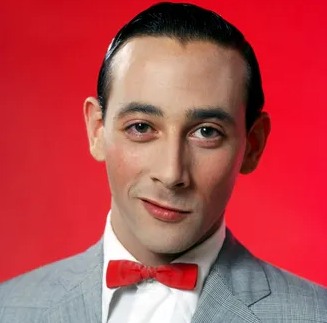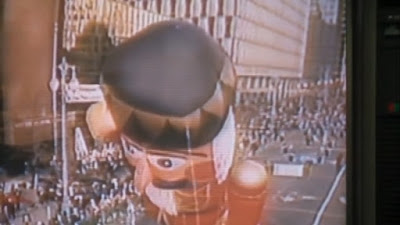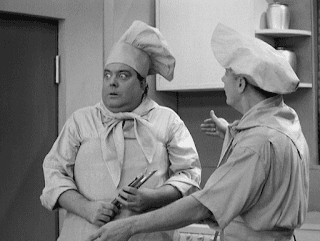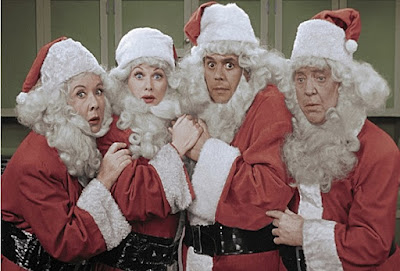The unfortunate news broke today that Paul Reubens, known to millions as the loveable man-child Pee Wee Herman, passed away yesterday at the age of 70 after a long, private battle with cancer.
Today's Camp YesterYear post was about Garfield in Paradise. I've pulled that article back, and it will reappear next Monday in place of August's "This Month In YesterYear History." The August lookback will show up on Thursday, August 4th.
While it may not be summer-related or even a happy topic, Paul Reubens brought so much joy to my childhood that I thought honoring him and his career with a look back upon his life was important.
As a very young child, I loved Pee Wee's Play House. My parents even let us watch Pee Wee's Big Adventure, which to this day, I cannot believe. I think they thought it was kid's entertainment. One of my biggest joys as a kid on Saturday mornings was when Mom would take us to the video rental store, and my Brother would rent a few Pee Wee's Play House VHS tapes. We'd quickly burned through them and often watched them multiple times before they were returned.
Of course, I had to have some of the Playhouse toys, and, much to my delight, I even had the playset. The box was ruined during a flood in my parent's basement, and during my foolish college years, I told my parents to toss the whole thing. I have repurchased all the figures over the years, but a mint-condition playset still eludes me.
Please click down below for other articles I've previously written about Pee Wee.
Paul Reubens was born Paul Rubenfeld on August 27, 1952, in Peekskill, New York. He grew up in Sarasota, a proud member of the Jewish community, the son of an automobile salesman and a teacher. As a child, he spent many summers in Oneonta, New York, enabling him to see some of the famed Catskills comedians at a young age. During the winter, he'd frequent the Ringling Brothers and Barnum & Bailey Circus, whose winter base of operations was in his hometown of Sarasota, Flordia. Reuben's credited the circus atmosphere for his love of entertainment. He also has credited Lucille Ball and "I Love Lucy" for influencing much of his comedy.
After graduating from Sarasota High School, he attended Boston University and began auditioning for acting schools. He was accepted to the California Institute of the Arts, causing him to move to California and work in restaurant kitchens or as a Fuller Brush salesman to make ends meet.
In the early 1970s, Reubens began performing at local comedy clubs, and made four guest appearances on The Gong Show as part of an act he had developed with Charlotte McGinnis, called The Hilarious Betty and Eddie. Soon after, he joined the Los Angeles–based improvisational comedy team The Groundlings. He remained a troupe member for six years, working with Bob McClurg, John Paragon, Susan Barnes, and Phil Hartman. Hartman and Reubens became friends and often wrote and performed on material together.
In 1980, Reubens appeared as a waiter in The Blues Brothers.
Reubens auditioned for Saturday Night Live for the 1980–1981 season, but Gilbert Gottfried, a close friend of the show's producer, got the job. Paul was so angry and bitter that he decided to borrow money and start his own show in Los Angeles using one of his characters from the Groundlings. So, in 1982, Pee Wee Herman made his first official appearance. After developing a similar character for several years doing improv, Reubens enlisted the help of other Groundlings like John Paragon and Phil Hartman. He took his show to The Roxy Theatre, where "The Pee Wee Herman Show" ran for five straight sellout months, doing midnight shows for adults and weekly matinees for children. HBO would film and produce an episode in 1981 of "The Pee Wee Herman Show" as part of their "On Locations" series.
Reubens's act had mainly positive reactions and quickly acquired a large following, despite being described in the press as "bizarre" and the "weirdest comedian around."
The name Pee Wee came from a small harmonica Paul Reubens owned as a child. The surname Herman was taken from a hyperactive friend from Reubens' childhood. The signature grey suit was originally made for Groundling's Director and Founder, Gary Austin, who passed it on to Reubens. The iconic red bow tie, Reubens claimed, was handed to him walking onto stage one day, and he was unaware of by whom.
The HBO special made Pee Wee an instant cult figure, and for the next decade, Paul was wholly committed to the character. When Pee-wee's fame started growing, Reubens moved out of the spotlight, making all his public appearances and interviews in character while billing Pee Wee as playing himself. Reubens tried getting the public to "think Pee Wee was a real person." He even only referenced his parents as "Honey and Herman Herman."
In the mid-1980s, Pee Wee made several memorable appearances on Late Night with David Letterman. These late-night appearances are still discussed today and gave him an even bigger following back then. During this same time, Reubens traveled the United States with a new "Pee Wee Herman Show," playing at Guthrie Theater in Minneapolis, Caroline's Comedy Club in New York City, and in 1984, in front of a sold-out Carnegie Hall.
After his stage show's success, Warner Bros. hired Reubens to write a script for a full-length Pee Wee Herman film. Reuben's original idea was to remake his favorite movie, Pollyanna. Halfway through writing the screenplay, Reubens noticed everyone at Warner Bros. had a bicycle, which inspired him to start working on a new script with his friend Phil Hartman.
The film "Pee Wee's Big Adventure" tells the story of Herman embarking on a nationwide adventure searching for his stolen bicycle. The movie went on to significant financial success, earning $41 million domestically, recouping six times its $7 million budget.
The financial and critical success before quickly developing into a cult fan favorite. Television networks took notice, too, and CBS agreed to sign Reubens to act, produce, and direct his own live-action children's program, Pee Wee's Playhouse. Reubens secured a budget of $325,000 per episode (the same as a prime-time sitcom of the era) and no creative interference from CBS.
The show began filming in New York City, and Cyndi Lauper sang the lyrics to the opening theme song. The show was designed to be educational yet entertaining and artistic but quickly acquired a dual audience of kids and adults. Reubens always tried to make Pee Wee a positive role model and consciously made the Playhouse show a moral show, teaching children the "ethics of reciprocity." He believed children liked the Playhouse because it was fast-paced, colorful, and "never talked down to them," while parents liked the Playhouse because it reminded them of shows from the past.
Right after the success of "Pee Wee's Big Adventure," Reubens began working with Paramount Pictures on a sequel called "Big Top Pee Wee." The film was less successful than "Big Adventure" and received only mild reviews. It only earned $15 million at the box office.
In 1986, Reubens provided the voice of the ship's computer in "Flight of the Navigator" but asked to be billed as Paul Mall. He also provided the voice for the droid Captain Rex in Star Tours, a Star Wars-themed motion simulator ride at Disneyland and Disney's MGM Studios.
Pee Wee's Playhouse would air on CBS from September 13, 1986, until November 10, 1990. Reubens had agreed to do three seasons and then signed on for two more. When CBS asked about a sixth season, Reubens declined, wishing to take a break from the Pee Wee character. Playhouse garnered 15 Emmy Awards, all of them for Creative Arts.
After starting his sabbatical from the Pee Wee character, Reubens was arrested in July 1991 for indecent exposure at an adult film theater in Sarasota, Florida. This arrest set off a chain reaction of national media attention that ruined much of the general public's view of Reubens and the Pee Wee character.
Immediately, Disney removed Reubens from photos and videos played in their theme parks, and Toys R Us removed the Pee Wee toys from store shelves. Nearly every day, a newspaper headline covered the "downfall" and "disgrace" of his arrest. On his attorney's advice, he pleaded "no contest" to avoid charges on his record. He was sentenced to 75 hours of community service, in which he developed two Public Service Announcement videos about the dangers of drugs.
Despite the smear job in the press, Reubens received much support from fellow artists and fans. Zsa Zsa Gabor, Cyndi Lauper, Annette Funicello, and Bill Cosby spoke in his defense. His fans organized support rallies after CBS canceled the Playhouse reruns, picketing in Los Angeles and New York. The television show "A Current Affair" received tens of thousands of responses to a telephone survey in which callers supported Reubens by a nine-to-one ratio.
The 90s were difficult for Reubens, who mostly stayed out of the limelight and worked to reclaim his good name. He did appear as Pee Wee at the 1991 MTV Video Music Awards on September 5, 1991, asking the audience, "Heard any good jokes lately?" He received a standing ovation. He made several minor appearances in film throughout the decade, such as the 1992 Tim Burton film "Batman Returns," as the Penguin's father.
In 1993, Reubens publically dated actress Debi Mazar, who he cited with ending his depression from his arrest.
He appeared six times between 1995 and 1997 in a recurring role on "The Murphy Brown Show." The role earned him good reviews and his only non-Pee Wee Emmy nomination.
The arrest postponed any major events starring Reuben's name until 1999, when he appeared in several large-budget projects like "Mystery Men" (1999), "Everybody Loves Raymond" (2000), and "Blow" (2001). In "Blow," Reubens played a flamboyant hairdresser turned drug dealer. His performance was praised heavily, and he again began receiving scripts for potential movie projects.
Just as his career seemed to be getting back on track, he was arrested again in November 2002. While filming David LaChapelle's video for Elton John's "This Train Don't Stop There Anymore," Reubens was informed that police were at his home with a search warrant. Acting on a tip from a witness in the pornography case against actor Jeffrey Jones, they found over 70,000 items of kitsch memorabilia, two grainy videotapes, and dozens of photographs the city attorney characterized as child pornography.
Kelly Bush, Reuben's representative at the time, and Reuben himself immediately denied the child pornography charges, claiming all the police found were "Rob Lowe's sex tape and a few 30-to-100-year-old collectible images."
Reubens turned himself in to the LAPD and was charged with misdemeanor possession of obscene material improperly depicting a child under the age of 18 in sexual conduct.
The district attorney looked at Reuben's collection and found no grounds to bring felony charges against him, somewhat clearing Reubens name.
The City Attorney, Rocky Delgadillo, allegedly decided to make a name for himself following the public spectacle and, on the last possible day allowed by statute, formally brought charges against Reubens.
Reubens issued this statement through his attorney: "One thing I want to make very, very clear, I don't want anyone for one second to think that I am titillated by images of children. It's not me. You can say lots of things about me. And you might. The public may think I'm weird. They may think I'm crazy or anything that anyone wants to think about me. That's all fine. As long as one of the things you're not thinking about me is that I'm a pedophile. Because that's not true."
After two years, the child pornography charges against Reubens were dropped in exchange for a guilty plea to a misdemeanor obscenity charge. He was required to register his address and not be in the company of minors without parental permission for three years.
Reubens spent the next two years in Florida caring for his terminally ill father, who died in February of 2004 from cancer.
After 2006, Reubens made cameos and appearances in numerous projects, such as "Reno 911," "30 Rock," "Pushing Daisies," and "The Blacklist."
During this time, Reubens worked on developing two more possible Pee Wee films. One was dark and adult, dubbed "The Pee Wee Herman Story," while the other was another family-friendly epic adventure called "Pee Wee's Playhouse: The Movie."
In November 2010, he starred on Broadway at the Stephen Sondheim Theatre, selling over $3 million worth of advance ticket sales for an updated recreation of "The Pee Wee Herman Show."
In February 2015, Netflix acquired the rights to produce a new Pee Wee film, "Pee Wee's Big Holiday," produced by Judd Apatow and Paul Reubens. The film was released on Netflix on March 18, 2016, to a very positive reception. The film included many nods to the original hit, "Pee Wee's Big Adventure."
Reubens had mostly remained out of the spotlight since. It was announced that Paul Reubens had passed away on July 30, 2023, at the age of 70, following a six-year battle with cancer that was never revealed to the public.
Despite his legal troubles over the years, Paul Reubens was beloved by many. Immediately following the news of his death, condolences, thoughts, and memories flooded social media in honor of the man who entertained so many for so many years.
Au Revoir, Pee Wee!







.png)





Comments